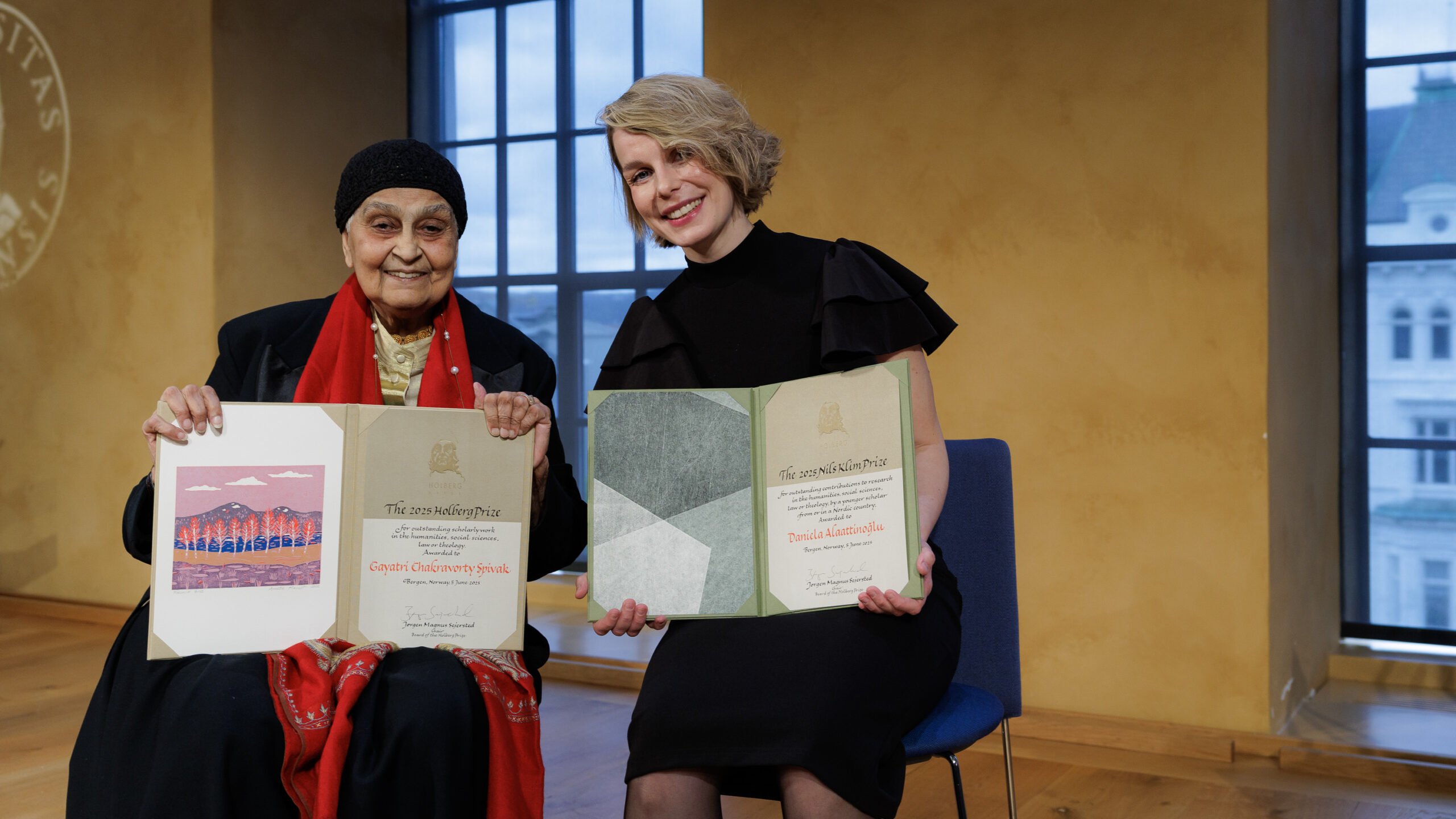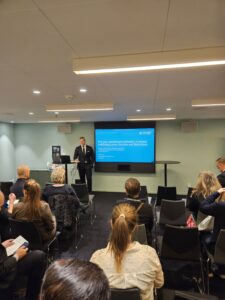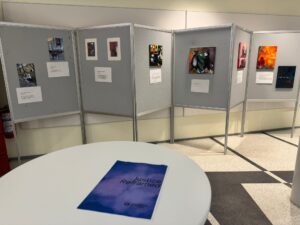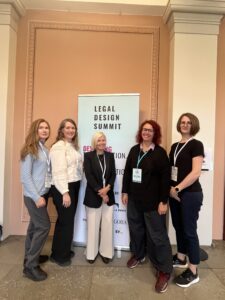The Nils Klim Prize and Holberg Week: Inspiration, Wonder and Lasting Memories
In June 2025, I travelled to Bergen, Norway, to take part in the Holberg Week as the recipient of the Nils Klim Prize. It was a profoundly inspiring and intense experience, filled with academic exchange, celebration and unexpected moments of joy (and chaos) with my young children. This reflection looks back at a week which brought together critical and feminist scholarship, public engagement and generous dialogue across generations and disciplines.
I spent the first week of June 2025 in Bergen, Norway, taking part in the Holberg Week as the recipient of the 2025 Nils Klim Prize. Holberg Week is held annually in honour of the Norwegian-Danish author, playwright and scholar Ludvig Holberg (1684–1754), who was himself born in Bergen. During the week, three academic prizes are awarded.
The first is the Holberg Prize, given to a scholar who has made outstanding contributions to research in the humanities, social sciences, law or theology. The second is the Nils Klim Prize—named after the protagonist of one of Holberg’s novels—which is awarded to a younger scholar (under the age of 40), based in or from a Nordic country, for exceptional research in the same fields. The third prize goes to the winners and finalists of the Holberg School Programme (for upper secondary school students).
The Nils Klim Prize is awarded by the Nils Klim Committee, composed of leading experts in relevant fields working across the Nordic countries. The selection is then approved by the Holberg Board. I was informed of the decision in late January this year—a minor shock, albeit a very positive one—but was asked to keep the news strictly confidential until the official announcement of the 2025 Holberg and Nils Klim Laureates in mid-March.
When the announcement came, I was absolutely thrilled to see that the 2025 Holberg Laureate was not only a scholar I recognised but a complete trailblazer and brilliant mind in postcolonial and feminist scholarship: Gayatri Chakravorty Spivak.
In their decision—too long to reproduce in its entirety here—the Nils Klim Committee wrote: Alaattinoğlu has already established herself as an independent scholar working across borders and cultures, drawing on various disciplines in coming to task with and interconnecting complex legal and social issues.
In Bergen, I was happy to meet several Committee members and was quite (positively) surprised when some of them even commented on specific texts which I have written.
I do not think I will ever forget the Holberg Week I experienced in 2025. The week was quite overwhelming, with my schedule planned down to the minute by the organisers at the University of Bergen (particularly by Bjørn Enge Bertelsen, Ingrid Ovidia Moe Telle and Ole Andreas Sandmo). The week began with a filmed scholarly interview on Monday, carried out by Jørn Jacobsen, followed by the Nils Klim Symposium on Tuesday—featuring the brilliant invited symposiasts Reetta Toivanen, Vibeke Blaker Strand and Maya Unnithan—and a public conversation between me and Gayatri Spivak. Wednesday included a day with the finalists of the Holberg School Programme and the 2025 Holberg Lecture, leading into the prize ceremonies and Government Banquet on Thursday. On Friday, before departing, I also gave a Masterclass for PhD researchers at the University of Bergen’s Faculty of Law.
My family joined me in Bergen, which was delightful, though intense—travelling with two small children (aged four and nearly two) can be a challenge. My daughter even attempted to join me on stage during my acceptance speech and had to be carried out by her father, to her great disappointment.
As the intensity of the week gives way to the more familiar rhythm of academic life, what will stay with me are the thoughtful exchanges I had with Gayatri Spivak—who turned out to be incredibly generous with her engagement—the meetings with Norway’s two Ministers of Research and Education (what a great idea to have two rather than only one!), my very nervous encounter with the Norwegian Crown Prince (I am not a royalist, so I was quite embarrassed by how nervous I was), the inspiring presentations by upper secondary school students and their proud teachers, as well as the exceptional hospitality offered by the Holberg Prize staff, the University of Bergen and the City of Bergen.
That both the Holberg and Nils Klim prizes were awarded to feminist scholars whose work addresses exclusion and marginalisation feels particularly meaningful. I hope these awards help highlight the importance of critical voices in our current moment—marked by backlash against liberal values, growing authoritarianism, as well as attacks on human rights, gender and sexuality studies and education more broadly. Receiving this award as a younger scholar, I will carry this recognition with me as a reminder to speak out, be bold and remain engaged in public discussion. Finally, I hope to carry forward the practice of learning—something Spivak so powerfully reminds us never to abandon.
Daniela Alaattinoğlu
Daniela Alaattinoğlu is an Assistant Professor of Law at the University of Turku. She is the recipient of the 2025 Nils Klim Laureate and the Principal Investigator of the project From the Margin to the Centre: Rights Development, Transitional Justice and Indigeneity in the Nordics (MARCEN), funded by the European Research Council (Starting Grant, 2025–2029).
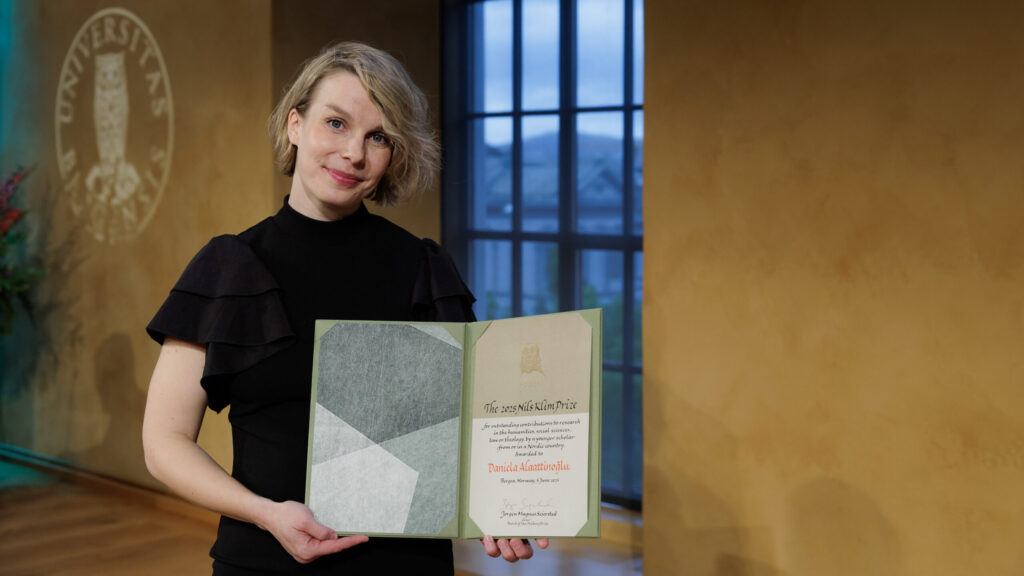
Further resources, for those interested:
Many of the academic events of the Holberg week can be watched here: https://holbergprize.org/events-and-productions/
Daniela’s acceptance speech is available here: https://holbergprize.org/news/2025-nils-klim-laureate-acceptance-speech/
A citation of the decision by the Nils Klim committee is available here: https://holbergprize.org/laureates/daniela-alaattinoglu/
An interview with Daniela, with Rosa Lampela, is available here: https://www.utu.fi/en/news/news/podcast-interview-with-2025-nils-klim-laureate-daniela-alaattinoglu
An interview with Daniela with the Critical Gender Studies Journal, is available here: https://cgsjournal.com/v2n102/
Photo credits: Photographer Eivind Senneset / The Holberg Prize

